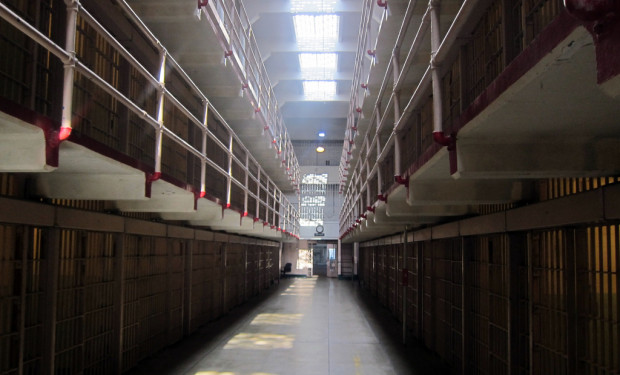Incarcerated today, ostracized tomorrow
Those labeled as felons face a lifetime of uphill battles, ranging from a loss of voting rights, gun rights, and housing rights.
“It is time to fundamentally rethink laws that permanently disenfranchise people who are no longer under federal or state supervision.” Attorney Generally Eric Holder spoke these words last month at the Leadership Council on Civil and Human Rights Criminal Justice forum. While he may have been speaking directly of felons’ right to vote, this statement can be applied to multiple facets of a felon’s life once released back into society.
In Michelle Alexander’s book The New Jim Crow, she speaks of how once a person is labeled a felon, they are ushered into a parallel universe in which “discrimination, stigma, and exclusion are perfectly legal, and privileges of citizenship such as voting and jury service are off-limits.” She goes on to say that regardless of the crimes committed, a felon’s “second-class citizenship begins the moment you are branded a felon.” When looking at recidivism statistics in America, it becomes obvious that some of these rates correlate with the stigma of being a felon. According to a study conducted by the Bureau of Justice Statistics, about sixty-eight percent of released prisoners were rearrested at least once for a new offense within three years. Further, once one is labeled a felon, many rights are taken away, including the right to vote, federal housing rights, and gun rights, even for non-violent offenders.
Multiple basic human rights are stripped from citizens who are labeled felons, even those non-violent offenders.
One example of a citizenship right that is taken from a majority of felons while incarcerated – and even upon release – is the right to vote. According to the American Civil Liberties Union, 5.85 million Americans are forbidden from voting. Currently in the United States, eleven states ban felons from voting for life; twenty states restore voting rights after their terms of incarceration, including parole and probation, are served; four states restore their rights after incarceration and parole are served; thirteen states restore just after incarceration; and two states do not restrict felons’ rights, even allowing them to cast absentee ballots while in prison. In North Carolina, voting rights are restored after a felon has served her term of incarceration and completed finished parole probation.
Attorney General Holder stated the act of banning felons from voting is at best profoundly outdated. In fact, he stated that banning felons from voting is unjust, counterproductive, and perpetuates a stigma on the formerly incarcerated, increasing the likelihood they will commit future crimes. The ban on voting takes the hardest hit on African American communities, where Attorney General Holder notes that one in thirteen cannot vote. In North Carolina in 2008, about 1.15% of the voting age population was ineligible to vote; however, in states where the African-American population is higher, such as Florida, 10.42% of the population is ineligible, a staggering figure as felons are permanently barred from voting.
Unlike voting rights, gun rights are forever stripped away upon being labeled as a felon, regardless of the nature of the felony. 18 U.S.C. § 922(g)(1) states that “anyone who has been convicted in any court of a crime punishable by imprisonment for a term exceeding one year is barred from possessing a gun.” A firearm includes any weapon, the frame or receiver of a weapon, a silencer or muffler for a firearm, and any destructive device, which includes a bullet.
Additionally, rights to federally funded housing (pdf) are limited, as criminal status, or being a felon, is not one of the classifications federally protected from discrimination. As Michelle Alexander notes in her book, anyone convicted of a felony is automatically ineligible for public housing assistance for at least five years and for even longer in the private sector. The Anti-Drug Abuse Act of 1988 granted public housing authorities the right to evict any tenant, household member, or guest who engaged in any criminal activity on or near public housing premises.
In the eyes of some, the label is one that is harsh and only causes further harm.
Geeta N. Kapur, a criminal defense and civil rights lawyer in Durham, North Carolina, has seen firsthand the impact of the label “felon.” She stated,
A felony conviction operates as a lifelong sentence of legal, political, and social exclusion from benefits such as public and private housing, student loans, voting, employment, etc. Once someone is convicted of a felony, they are labeled for the rest of their life by their worst mistake and then banished to live outside mainstream society. We as a society refuse to forgive them.
And it seems that Ms. Kapur is correct. A felon who is currently finishing out their probation period and spoke with the Law Observer on the condition of remaining anonymous agreed that every human being makes mistakes, and one should not be labeled and ostracized from society for life based upon one event. As an example, the individual cited an alcoholic who achieves sobriety. Society does not continue referring to the person as an alcoholic and forcing him to suffer consequences because of the label; instead, they maintain all their rights and are treated as a human being. The same can be said for those who have been incarcerated, but instead, society expects their failure and casts them aside. This person stated that the label hurts, and they are thankful they went to prison later in life, as they could not imagine trying to navigate through life if they received a felony at a young age. Unfortunately, however, 57.6% of currently incarcerated federal inmates are under the age of 40.
Perhaps everyone could take a lesson from Ms. Kapur, who stated that if we label those formerly incarcerated as people and see their humanity, there is a possibility we will also see their feelings, needs, hopes, fears, and dreams.






